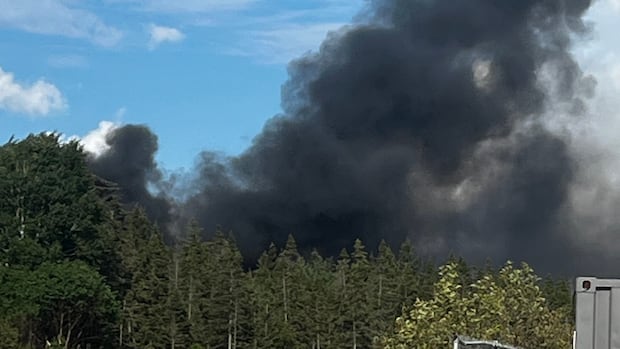Autoworkers at the Stellantis Windsor Assembly plant can expect to work fewer hours for the next 12 weeks as the plant switches between full-production, reduced shifts and full shut-downs.
The change comes as auto makers continue to navigate U.S. tariffs on the Canadian auto sector.
But a spokesperson for the company did not mention the tariffs in an email to CBC News about the new schedule.
Instead, Lou Ann Gosselin said the changes are associated with the changeover in production year.
“These modifications are necessary as we complete the 2025 model year build and prepare for the launch of the 2026 model year Chrysler Pacifica, Chrysler Voyager/Grand Caravan and Dodge Charger,” Gosselin said.
“We will continue to monitor the situation.”
But while the company blames production changes for the new schedule, the president of the union representing the plant’s workers blames the U.S. trade war.
‘This is absolutely about tariffs’
“We know that this is absolutely about tariffs,” said James Stewart, the president of Unifor Local 444.
“The constant changing, the pausing, the on-again-off-again, the lack of clarity around them, the confusion around them, the pain that it’s causing these suppliers. There’s not any confidence, consumer confidence, both in the U.S. and Canada based on what he’s doing.”
Local 444 has told its members to expect “alternate and fluctuating work schedules” for the next 12 weeks.
It posted the following schedule on its Facebook page:
- Week of May 12, May 19 and June 30: Two shifts running.
- Week of May 26, June 9 and June 23: only shift one working.
- Week of June 2, June 16 and July 7: only shift two working.
- Week of July 14: production down.
- Weeks of Aug. 18 and 25: planned summer shutdown.
Workers at the assembly plant have faced uncertainty ever since U.S. President Donald Trump slapped a 25 per cent tariff on all imported vehicles in early April.
That resulted in an immediate two-week shutdown at the plant.
Since then, tariffs on imported auto parts have also gone into effect – though they do not apply to parts compliant with the Canada U.S. Mexico free trade agreement (CUSMA).
Trump also recently announced some relief to auto manufacturers in the form of credits of up to 15 per cent of the value of vehicles assembled domestically and a pledge not to hit automakers with stacked tariffs on vehicle components, such steel and aluminum.
The reduced work schedule at the Windsor Assembly Plant did not come as a surprise to workers, given the all of the uncertainty, Stewart told CBC News.
“When they first indicated to us about a month ago that they were [temporarily shutting] down after President Trump in the U.S. had made his announcement on trade tariffs … they said they were going to do an assessment moving forward,” Stewart said.
“We had been in a lot of talks over the last month.”
In addition to reducing the production schedule, Stellantis has also informed the union that it has postponed plans to add a third shift at the Windsor plant in the second half of 2025, the union said on Facebook.
Those plans are delayed until 2026.
Gosselin told CBC News, “It remains our intention to return the Windsor Assembly Plant to a three-shift operation. However that action will not take place in 2025 based on current market conditions.”
Stewart said the company has not signaled any intention to move remaining production out of Canada.
“So, you know, that’s a good sign,” he said.
“We understand that … all of the automakers are trying to … figure out a road map. … It’s not a free market system when you’re being bullied into building product in one country, especially the country that brags about being a free market, you know?”
Meanwhile, as Local 444 members prepare for reduced work schedules, the union representing Stellantis workers in Michigan is holding rallies in the state this week to pressure Stellantis to up its U.S. production by taking advantage of unused capacity at its Michigan facilities and to demand the company abandon efforts to fight the U.S. tariff regime.
But Stewart insisted that the United Autoworkers are aware that Canada is not stealing American jobs.
Keeping track of the puck in the midst of U.S. President Donald Trump’s trade war can be challenging. CBC’s Katerina Georgieva explains where things stand when it comes to the automotive industry.
“In one of the UAW rallies in the last, you know, 48 hours, one of them actually said something about not leaving Canada and Mexico behind,” he said.
“So I can appreciate some of that. But the UAW does know Canada is not the problem.”
It’s unfair for the U.S. to characterize Canada as stealing American jobs, Stewart said.
Canadian auto sector jobs are well-paid jobs with good health benefits and good safety standards, he said.
“We’ve had … manufacturing in auto here for over 100 years. So these are not American jobs.”







